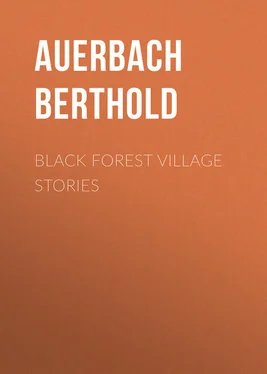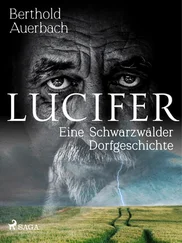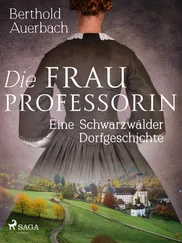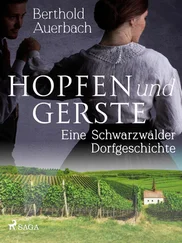Berthold Auerbach - Black Forest Village Stories
Здесь есть возможность читать онлайн «Berthold Auerbach - Black Forest Village Stories» — ознакомительный отрывок электронной книги совершенно бесплатно, а после прочтения отрывка купить полную версию. В некоторых случаях можно слушать аудио, скачать через торрент в формате fb2 и присутствует краткое содержание. ISBN: , Жанр: foreign_antique, foreign_prose, на английском языке. Описание произведения, (предисловие) а так же отзывы посетителей доступны на портале библиотеки ЛибКат.
- Название:Black Forest Village Stories
- Автор:
- Жанр:
- Год:неизвестен
- ISBN:http://www.gutenberg.org/ebooks/32517
- Рейтинг книги:4 / 5. Голосов: 1
-
Избранное:Добавить в избранное
- Отзывы:
-
Ваша оценка:
- 80
- 1
- 2
- 3
- 4
- 5
Black Forest Village Stories: краткое содержание, описание и аннотация
Предлагаем к чтению аннотацию, описание, краткое содержание или предисловие (зависит от того, что написал сам автор книги «Black Forest Village Stories»). Если вы не нашли необходимую информацию о книге — напишите в комментариях, мы постараемся отыскать её.
Black Forest Village Stories — читать онлайн ознакомительный отрывок
Ниже представлен текст книги, разбитый по страницам. Система сохранения места последней прочитанной страницы, позволяет с удобством читать онлайн бесплатно книгу «Black Forest Village Stories», без необходимости каждый раз заново искать на чём Вы остановились. Поставьте закладку, и сможете в любой момент перейти на страницу, на которой закончили чтение.
Интервал:
Закладка:
"Of course it is," said the person addressed, whose voice he recognised as belonging to Little Red Meyer, a Jewish peddler. "Why, they were always seen together: for my part, I don't see how he ever made up his mind to marry anybody else."
"Well," said Kitty, laughingly, "I only want to make him stare a little on our wedding-day. So you won't disappoint me, will you?"
"I'll do it as sure as I want to make a hundred thousand florins."
"But Hansgeorge mustn't hear a word about it."
"Mum's the word," said Little Red Meyer, and took his leave.
Hansgeorge came in rather sheepishly, being ashamed to confess that he had been listening. But when they sat closely side by side, he said, "Kitty, don't let them put any nonsense into your head: it's no such thing. They once used to say that I was courting the maid at the Eagle, who is now in Rothweil: don't you believe a bit of it. I wasn't confirmed then: it was nothing but child's-play."
Kitty pretended to lay great stress on this matter, and put Hansgeorge to a world of trouble to clear himself. In the evening he did his best to pump the whole secret out of Little Red Meyer; but all in vain: his word was "mum."
Hansgeorge had many things to go through with yet, and, in a manner, to run the gauntlet of the whole village. On the Sunday before the wedding, he, as well as his "playmate" Fidele, adorned their hats and left arms with red ribbons, and went, thus accoutred, from house to house, the groom that was to be repeating the following speech at every call: – "I want you to come to the wedding on Tuesday, at the Eagle. If we can do the same for you, we will. Be sure to come. Don't forget. Be sure to come." Thereupon the housewife invariably opened the table-drawer and brought out a loaf of bread and a knife, saying, "There! have some bread." Then the intended groom was expected to cut a piece from the loaf and take it with him. The loss of his forefinger made Hansgeorge rather awkward at this operation; and many would hurt his feelings unintentionally by saying, "Why, Hansgeorge, you can't cut the bread. You oughtn't to get married: you are unfit for service."
Hansgeorge rejoiced greatly when this ordeal was over.
The wedding was celebrated with singing and rejoicing, although there was no shooting, as it had been strictly forbidden since Hansgeorge's misfortune.
The dinner was uncommonly merry. Immediately after it, Kitty slipped out into the kitchen, and came back with the memorable pipe in her mouth: no one, at least, could say that it was not the same. Kitty puffed away a little with a wry face, and then handed it to Hansgeorge, saying, "There, take it: you have kept your word like a man, and now you may smoke as much as you please. I don't mind it a bit."
Hansgeorge blushed up to the eyes, but shook his head. "What I have said is said, and not a mouse shall bite a crumb off: I'll never smoke again in all my life. But, Kitty, I may kiss you after you've done smoking, mayn't I?"
He strained her to his heart, and then confessed, laughing, that he had overheard a part of Kitty's talk with Little Red Meyer, and had supposed they were speaking of the maid at the Eagle. The joke was much relished by all the company.
The pipe was hung up in state over the wedding-bed of the young couple; and Hansgeorge often points to it in proof of the maxim that love and resolution will enable a man to overcome any weakness or foible.
Many years are covered by a few short words. Hansgeorge and Kitty are venerable grandparents, enjoying a ripe old age in the midst of their descendants. The pipe is an heirloom in which their five sons have a common property: not one of them has ever learned to smoke.
MANOR-HOUSE FARMER'S VEFELA
1
Not many will divine the orthography of this name in the Almanac; yet it is by no means uncommon, and the fate of the poor child who bore it reminds one strongly of the German story of her afflicted patroness, the holy St. Genevieve.
The grandest house in all the village, which has such a broad front toward the street that all the wandering journeymen stop there to ask for a little "assistance," once belonged to Vefela's father: the houses standing on each side of it were his barns. The father is dead, the mother is dead, and the children are dead. The grand house is now a linen-factory. The barns have been altered into houses, and Vefela has disappeared without a trace.
One thing alone remains, and will probably remain for all time to come. Throughout the village the grand house still goes by the name of the Manor-Farmer's House; for old Zahn, Vefela's father, was called the Manor-House Farmer. He was not a native of the village, but had moved there from Baisingen, which is five miles away. Baisingen is one of those fertile villages called "straw shires," and the Baisingers were nicknamed "straw-boots," from their custom of strewing the streets of the village with straw. The German peasantry are not difficult to please in point of cleanliness; and such a device suits their tastes for two reasons: it saves street-sweeping and helps to make manure for the numerous fields of such rich folk as the Baisingers. The Manor-House Farmer lived in the village thirty years; but he never had a dispute without hearing himself reviled as the Baisingen straw-boots, and his wife as the Baisingen cripple. Mrs. Zahn had a fine figure and a good carriage; but her left leg was a little short and made her limp in walking. This defect was a chief cause of her unusual wealth. Her father, whose name was Staufer, once said publicly at the inn that the short leg shouldn't hurt his daughter, because he would put a peck of crown-thalers under it as her wedding-portion, and see if that wouldn't make it straight.
He kept his word; for when his daughter married Zahn he filled a peck-measure with as many dollars as would go into it, stroked it as if it had been wheat, and said, "There! what's in it is yours." To keep up the joke, his daughter was told to set her foot upon it, and the peck of silver flourished on the wedding-table as one of the dishes.
With this money Zahn bought the manorial estate of the counts of Schleitheim, and built the fine house from which he took his nickname. Of nine children born to him, five lived, – three sons and two daughters. The youngest child was Vefela. She was so pretty and of such delicate frame that they used to call her, half in scorn and half in earnest, "the lady." Partly from pity and partly from malice, every one said in speaking of her that she was "marked," for she had inherited the short leg of her mother. This expression has an evil meaning: it is applied to humpbacks, to one-eyed and lame persons, as if to insinuate that God had marked them as dangerous and evil-disposed. Being too frequently treated with scorn and suspicion, these unfortunates are often bitter, crabbed, and deceitful: the prejudice against them provokes the very consequences afterward alleged in proof of its truth.
It was not that Vefela did harm to any one: she was kind and gentle to all. But the hatred felt by all the village against the manor-house farmer was transferred to his children.
For eighteen years the manor-house farmer carried on a lawsuit with the village commune. He claimed the seignorial rights of the estate. He had fifty votes in the election of the squire; and he drew the smoking-tithe, the chicken-tithe, the road-tithe, and a hundred other perquisites, which the farmers never paid without the greatest chagrin, grumbling, and quarrelling. Such is human nature! A count or a baron would have received all these taxes without much difficulty; but the farmer had to swallow a curse with every grain which was yielded by his fellows. For want of a better revenge, they mowed down the manor-house farmer's rye-fields at night while the corn was yet green. But this only made matters worse, for the manor-house farmer recovered his damages from the commune; and he employed a gamekeeper of his own, half of whose salary the villagers were bound to pay. So there was no end to petty disagreements.
Читать дальшеИнтервал:
Закладка:
Похожие книги на «Black Forest Village Stories»
Представляем Вашему вниманию похожие книги на «Black Forest Village Stories» списком для выбора. Мы отобрали схожую по названию и смыслу литературу в надежде предоставить читателям больше вариантов отыскать новые, интересные, ещё непрочитанные произведения.
Обсуждение, отзывы о книге «Black Forest Village Stories» и просто собственные мнения читателей. Оставьте ваши комментарии, напишите, что Вы думаете о произведении, его смысле или главных героях. Укажите что конкретно понравилось, а что нет, и почему Вы так считаете.












